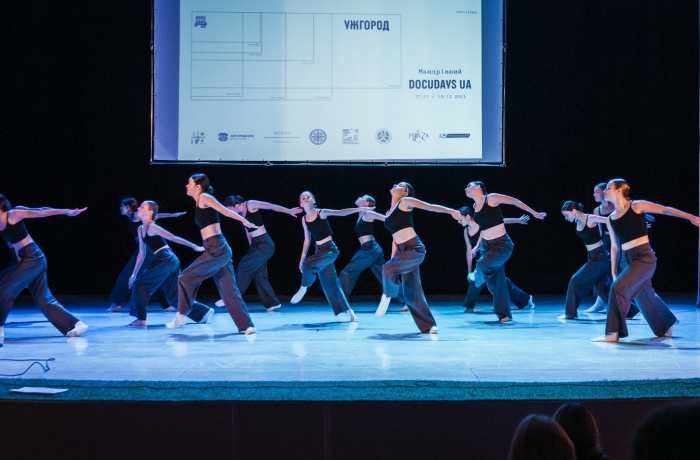20th Travelling Docudays UA in Numbers
20th Travelling Docudays UA in Numbers

We were able to visit 77 cities, towns and villages in 16 Ukrainian regions.
Our resilient and inspired regional coordinators involved over 200 local partners in the organisation of the Travelling Festival 2023, and they conducted 446 events in total. They were able to do it despite air raid sirens, explosions, loss of mobile connection and capricious weather!
Together, we organised 347 film screenings (315 offline and 32 online), and 59 events involving the film crews, including 35 online and 24 offline. In addition, we organised 99 human rights events (seminars, training sessions, lectures, masterclasses, exhibitions).
Where did it all happen?
110 festival events were held in schools, grammar schools and lyceums, 13 in vocational colleges, 10 in higher education institutions, 3 in academies, 71 in hubs, leisure centres, youth centres, anti-cafes, 49 in libraries, 71 in public spaces, 8 in houses of culture, 41 in NGO offices, 10 in museums and galleries, 1 in a free legal aid centre, 2 in shopping malls, 4 in cinemas, 3 in professional technical education institutions, 2 in rural councils, 13 in Docudays UA film clubs.
Importantly, there were 21 events for convicts in institutions of the North-Eastern Inter-regional Department of Criminal Sentence Implementation in the Kharkiv, Sumy, and Poltava Regions. These events involved 1,741 participants.
In total, the 20th Travelling Festival was attended by 63,935 viewers.
63% of the surveyed visitors of the Travelling Docudays UA participated in the Festival for the first time!
90% audience members will recommend that their friends attend the festival.
50% of people changed their opinion about the topic raised in the film after watching it. For another 25.2%, an event or a film partially changed their opinions about the discussed subjects.
We watched 19 films together from 13 countries: Ukraine, Switzerland, France, Belgium, Germany, Poland, Italy, Denmark, Czech Republic, Ireland, UK, US, Canada.
The favourites in terms of the number of screenings were the Ukrainian films Guests from Kharkiv by Halyna Lavrinets (42 screenings), Second Wind by Maksym Lukashov (40) and 89 Days by Pavlo Dorohoi (36).
The films that travelled the most with their film crews were King Lear: How We Looked for Love during the War by Dmytro Hreshko (they visited Boryspil, Lviv, Uzhhorod, Chuhuyiv, Zaporizhia, Kryvyi Rih, Kremenchuk, Zhmerynka, Kosiv, Ivano-Frankivsk); as well as Guests from Kharkiv, which we have mentioned before, who visited Poltava, Dnipro, Cherkasy, Kaniv, Kremenchuk, Horishni Plavni, Khmelnytskyi, Kompaniyivka, Khmilnyk, Ivano-Frankivsk, Zhmerynka.
Our brave guest of the festival Piotr Pawlus, the director of In Ukraine, had to change 9 means of transportation on his way from Warsaw to Lviv to show the film and see the audiences, and then travelled from Lviv by bus to Uzhgorod, from Uzhhorod to Stryi, from Stryi to Ivano-Frankivsk by taxi on ice-covered roads, from there to Ternopil by bus, and from Ternopil to Chortkiv and back from Chortkiv to Przemyśl to take the Krakow-Warsaw train. It was an incredible adventure!
And a team of Kherson journalists, despite daily bombings of their home city and their destroyed office that has been hit by a missile, selflessly went on a journey around Ukraine and met the Travelling Festival’s guests in person at 8 screenings. We saw the truly Unconquered Kherson.
The online format made it possible for us to talk at long distances. We were joined by the American filmmaker Matt Sarnecki to watch his film The Killing of a Journalist together and talk about justice through cinema. A recording of the livestream on this topic drew the attention of 41,000 viewers.
An important topic of the Travelling Festival was Ukraine’s recovery. In this matter, there were many thoughts about the 7 Lugano Principles — Partnership; Reform Focus; Transparency, Accountability, and the Rule of Law; Democratic Participation; Multi-Stakeholder Engagement; Gender Equality and Inclusion; Sustainability.
By the way, do you know that recordings of three human rights discussions in Uzhhorod, Ivano-Frankivsk and Kremenchuk are now available in the DOCUSPACE Cinema free of charge? They include a discussion about how citizens can influence government decision making with one of the Lugano Declaration’s developers Oleksandr Solontay and activist Vitaliy Selyk; a discussion about the future peace and security and the world after “russia” with the diplomat Pavlo Klimkin; and about how to start building strong Ukraine right now with the political scientist Mykola Davydiuk and the musician Anton Slepakov.
We spoke truly loudly and were heard: 233 media wrote about us, 632 social media posts were dedicated to us, and most poignantly, we recorded the history of the 20 years of the Travelling Festival in 6 conversations with regional coordinators and founders in our joint media project with Liroom, Love, Truth, and Videotapes.
We are immensely grateful to you for participating in the creation of this incredible festival!
Read about us, talk with us, watch documentaries about human rights.
See you at the 21th Travelling Festival!
Header photo: Vitaliy Diachuk and Yaroslav Diulenko
The 20th Travelling Docudays UA was held with the support of the Embassy of Sweden in Ukraine, Embassy of Switzerland in Ukraine, US Embassy in Ukraine. The opinions, conclusions or recommendations do not necessarily reflect the views of the governments, charities, or companies of these countries. Responsibility for the contents of the material lies solely on its authors.












